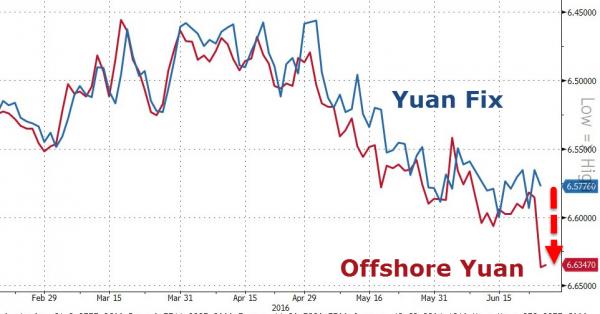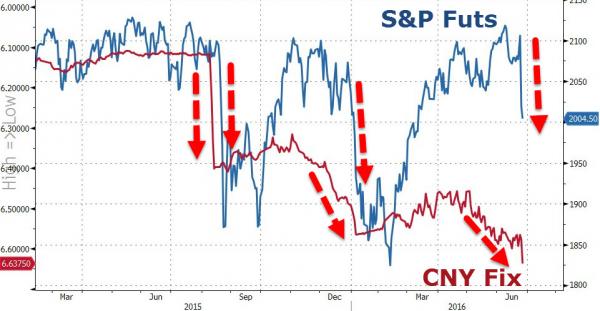
Harris&Ewing President Hoover lights Nation’s Capital community Xmas tree Dec 24 1929

Because of articles like this?! Because of how the BBC reports on the election?
• Why Is Jeremy Corbyn Seen As So Unelectable (Abc.au)
Jeremy Corbyn is railing against “cuts, closures and poverty”. He’s campaigning to build more homes, and to fight fewer wars. He’s condemning the Tories for creating a “divided and unequal society”. But these are snippets not from his 2019 bid for Downing Street. They were his slogans in 1983, when he first ran for Parliament.The simple fact is the Labour leader has never changed his views. In the late 1970s and 1980s he and his staunch left-wing colleague John McDonnell, now the shadow chancellor, promised a revolution to upend the Western capitalist order. And yet, in 2015, as he was fighting to take over the leadership of the party, he was pledging the same: “Capitalism is in its death throes!”
It’s not mere sloganeering. His policy agenda over the past year has been: renationalise British utilities and trains, cap all wages, and force large companies to transfer 10 per cent of their equity to their employees. It says something about the depths of the austerity cuts in Britain that Mr Corbyn was not only backed into the Labour leadership, but went on to gain the largest increase in the party’s share of the vote in the 2017 election since World War II. And in the torrid political climate that followed, many would have expected Labour to romp home this time around. Over the past three years, the Conservative Party has imploded, with grave wounds struck to much of its credibility. Once Theresa May was torn down and replaced by Boris Johnson, a man with a public reputation as a liar, perhaps in any other generation of politics Labour would have been a shoo-in. But this time around, Mr Corbyn has been found deeply unelectable.

The antisemite slur has worked miracles. Ley me repost the graph that shows 0.08% of Labour members are.
• Ideology or Popularity: How Will Britain Vote? (CP)
It’s not news that Jeremy Corbyn isn’t a popular figure. It’s also not news that Jeremy Corbyn’s policies are hugely popular with the British public. Why should the first of these appear to matter more than the second? [..] The secret to the Tories’ possible success seems to be to focus less on the issues, and not at all on their own leader (who can’t be bothered to turn up for an interview or a debate). Instead, they are focusing on Labour’s unpopular leader. And the odd thing is that it seems to be working. The muckraking includes calling Corbyn an anti-semite, but it doesn’t stop there. (Somehow the fact that Boris Johnson has a habit of making racist comments is irrelevant; Labour is an anti-racist party and therefore must be held to a higher standard.)
A new book by Tom Bower paints a portrait of a power hungry anti-semite who regularly hangs out with Muslim extremists. Anyone with an ounce of sense will struggle to find the Labour leader in this description; for his part Bower had the sense not to source his allegations so there’s no way to check up on which of these might be true and which are blatant fabrications. For anyone interested, Peter Osborn has a thorough debunking. The advantage of mudslinging is that it sometimes sticks. Many British voters can’t say exactly why they don’t like Corbyn, but they know that they don’t like him. Even if these allegations were defendable, Corbyn’s Labour party has effectively won the debate on austerity.
Both parties are promising to protect the NHS from privatization, but only one party is actually selling NHS data to private companies like Amazon. That should matter a lot more than whether or not the British public would like to go on holiday with Jeremy Corbyn. Whatever the outcome, this is one of the most fascinating elections on record. Arguments for the status quo – that the rich should see the biggest gains when capitalism works and the poor should pay when it doesn’t – aren’t working. Demonization of one’s opponents has always been a part of electoral politics, but in this election that’s pretty much the only tactic in play, at least for the Tories. Their victory would be a huge triumph of the British propaganda system. It would also be a huge failure for democracy.
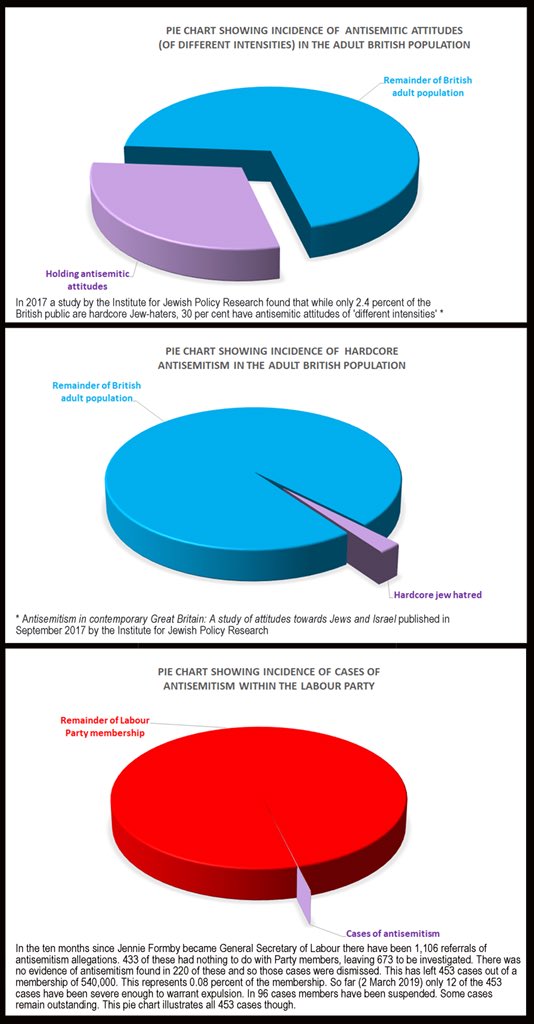

Just not a funny one.
• The Steele Dossier Was Always a Joke (Taibbi)
The Guardian headline reads: “DOJ Internal watchdog report clears FBI of illegal surveillance of Trump adviser.” If the report released Monday by Justice Department Inspector General Michael Horowitz constitutes a “clearing” of the FBI, never clear me of anything. Holy God, what a clown show the Trump-Russia investigation was. Like the much-ballyhooed report by Special Counsel Robert Mueller, the Horowitz report is a Rorschach test, in which partisans will find what they want to find. Much of the press is concentrating on Horowitz’s conclusion that there was no evidence of “political bias or improper motivation” in the FBI’s probe of Donald Trump’s Russia contacts, an investigation Horowitz says the bureau had “authorized purpose” to conduct.
Horowitz uses phrases like “serious performance failures,” describing his 416-page catalogue of errors and manipulations as incompetence rather than corruption. This throws water on the notion that the Trump investigation was a vast frame-up. However, Horowitz describes at great length an FBI whose “serious” procedural problems and omissions of “significant information” in pursuit of surveillance authority all fell in the direction of expanding the unprecedented investigation of a presidential candidate (later, a president). Officials on the “Crossfire Hurricane” Trump-Russia investigators went to extraordinary, almost comical lengths to seek surveillance authority of figures like Trump aide Carter Page. In one episode, an FBI attorney inserted the words “not a source” in an email he’d received from another government agency.
This disguised the fact that Page had been an informant for that agency, and had dutifully told the government in real time about being approached by Russian intelligence. The attorney then passed on the email to an FBI supervisory special agent, who signed a FISA warrant application on Page that held those Russian contacts against Page, without disclosing his informant role. Likewise, the use of reports by ex-spy/campaign researcher Christopher Steele in pursuit of Foreign Intelligence Surveillance Act (FISA) authority had far-reaching ramifications. Not only did obtaining a FISA warrant allow authorities a window into other Trump figures with whom Page communicated, they led to a slew of leaked “bombshell” news stories that advanced many public misconceptions, including that a court had ruled there was “probable cause” that a Trump figure was an “agent of a foreign power.”

Make sure it’s no longer hidden. Put the spotlight on Brennan and Clapper to start with.
The essence of a coup, which some might refer to as covert action, is the hidden hand. One does not announce that a foreign power is overthrowing the government and installing a new government. One pulls strings as if from behind a curtain, making events that are all part of a carefully orchestrated plan appear disconnected, spontaneous and serendipitous. As I read through the recently released IG report for the second time, as someone with a great deal of experience in military and intelligence matters, I see that hand everywhere. Per the IG report, a single report is delivered to the FBI in the summer of 2016. It concerns a meeting between a cooperative contact of a foreign intelligence service and a junior level employee of the Trump campaign, George Papadopoulos.
The report relates what are frankly very amorphous comments by Papadopoulos concerning the Russian government and its alleged possession of information on Hillary Clinton. On any other day this report would command no attention whatsoever. The source in question has no track record of any kind with the FBI. Papadopoulos has been employed by the Trump campaign for perhaps 90 days at this point, and there is no reason to believe he has contacts of significance in the Kremlin. Not on this occasion. This one report from a foreign intelligence service goes directly to the top of the FBI. The Director himself, James Comey is briefed. A full investigation is launched. Multiple confidential human sources are tasked. Wiretaps are ordered. A task force is organized. Crossfire Hurricane is born.
There is a problem, though. This hand, perhaps because it is controlled by individuals who have made their bones riding desks in Washington, DC and not in the field running actual operations, is clumsy. The information regarding Papadopoulos provided the needed pretext to start an investigation, but most of the people who will now form the investigative team are not in on the plot. They will have to be led to the pre-ordained conclusion, so that it appears that they did so without outside interference. And these investigators have a pesky habit of actually doing their jobs.

Bad for automakers and Big Oil. Other than that, though…
• The Global Auto Market Collapse (ZH)
It is no secret that the auto market worldwide has been mired in recession that looks to not have any plans of decelerating anytime soon. We have covered, at length, the collapse of auto sales not only in the U.S., but in leading global markets like China and Europe over the last 18 months. We have also covered how the “silver lining” of EV sales and investment in electric vehicles, may not be enough to stoke a recovery in the industry, especially with major cities like Beijing starting to shy away from purchase subsidies. The contagion has spread, and a new article by Bloomberg includes four charts that show just how damaging the effects have been globally. The first shows that global auto sales peaked two years ago at slightly under 86 million on an LTM basis. In October, that number stood at 78 million, a decline of about 9%.
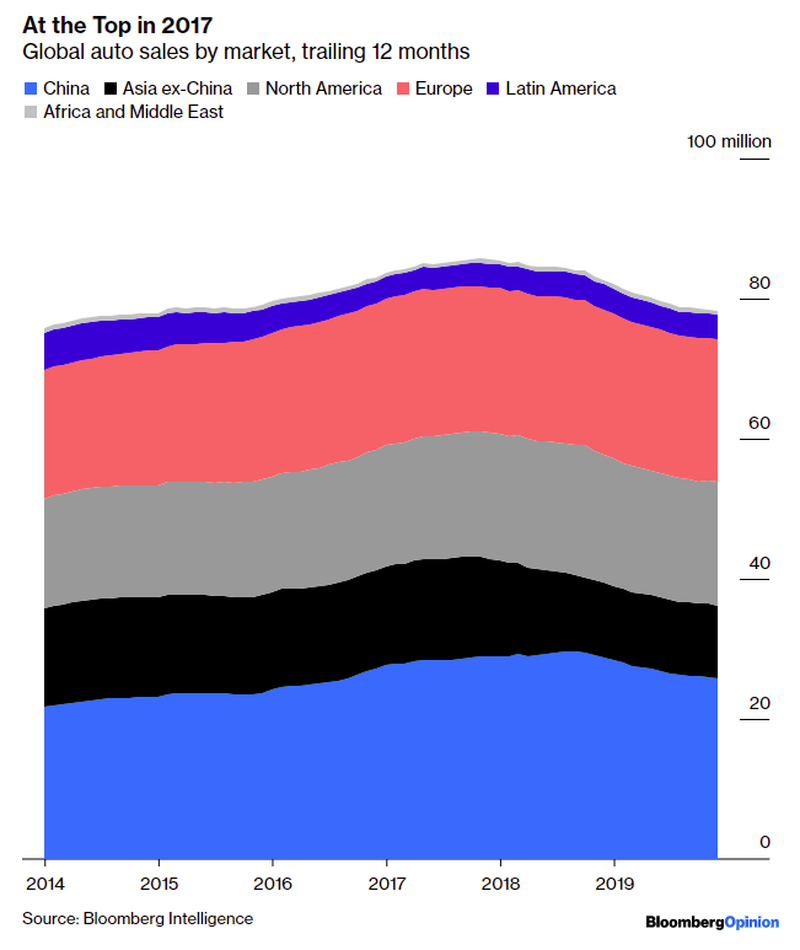
The second chart shows trends from across the globe, noting that since China’s market is so big, that it is been obscuring falling trends elsewhere in the world. The chart shows China, Asia ex-China, North America, Europe, Latin America and Africa/Middle East all in steep downtrends.
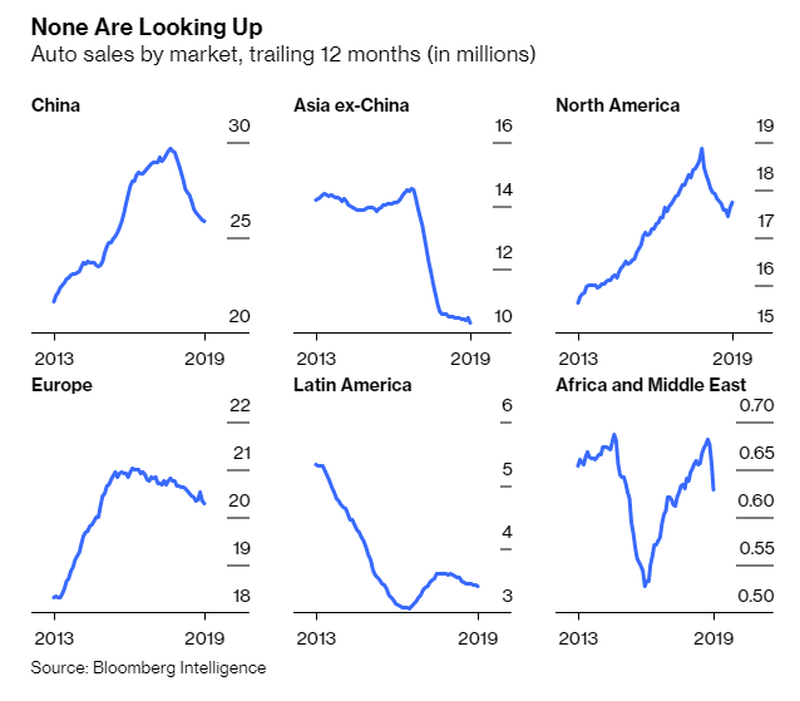

Europe’s “new growth strategy.” Oh boy…
• EU Lauds New Green Deal As Europe’s ‘Man On Moon Moment’ (DW)
The European Commission signed off on President Ursula von der Leyen’s “European Green Deal” on Wednesday in Brussels, with a promise of money for EU nations that are lagging behind. The European Green Deal will still need to be approved — by the leaders of the EU’s member states and the European Parliament — for the climate policies to be implemented into law. The climate change resolutions will be considered by the leaders of EU countries at their meeting in Brussels on Thursday. Von der Leyen, who has put climate issues at the center of her presidency, described the plan as Europe’s “new growth strategy.”
“We do not have all the answers yet, today is the start of a journey, but this is Europe’s man on the moon moment. The European Green Deal is very ambitious, but it will also be very careful in assessing the impact and every single step we’re taking.” Von der Leyen said an economic growth plan based on fossil fuels and pollution was “out of date and out of touch.” “The European Green deal is on one hand about cutting emissions, but on the other hand, about creating jobs and boosting innovation.”

Can she stay out of the debate and still win?
• “Afghanistan Papers” May Be A Game Changer For Tulsi Gabbard (IDS)
Three very interesting things happened today in Tulsi Gabbard’s campaign for the Democratic nomination for the US Presidency. First, there was a huge story in The Washington Post about the so-called “Afghanistan Papers,” which reveal thousands of pages of confidential interviews with hundreds of key US government officials telling how the Bush, Obama and Trump administrations lied to the American public about the prosecution of the 18-year US war in Afghanistan—how successive US administrations manipulated data about the war to paint a much rosier picture of US and Afghan government achievements throughout the conflict. How big is this story? Think “Pentagon Papers.” Daniel Ellsberg. Think Vietnam big.
The story should suck up a lot of oxygen over the next few weeks, and it is one that should produce some unusually positive coverage for Tulsi, given that the issue of the failures of US military interventionism overseas has been the primary focus of her campaign. The second interesting thing is the story has the potential to tie into another story involving a management consulting firm called McKinsey & Company that performed confidential contract work in Afghanistan and Iraq. The reason McKinsey could be relevant to Tulsi’s campaign is that one of her main rivals for the nomination, Pete Buttigieg, happened to work for McKinsey from 2007 to 2010. Pete has indicated that his stint with McKinsey involved working on “war zone economic development to help grow private sector employment” in Iraq and Afghanistan.
In plain language, Pete appears to have been part of broader effort by the US government to transform Afghanistan into some sort of a mini capitalist democracy—not unlike the silly US plan to create a Jeffersonian democracy in Iraq. Now, there may be nothing to the connection between the first and second stories. However, during Tulsi’s town hall this evening in Nashua, New Hampshire, it is curious that Tulsi specifically mentioned McKinsey in referencing how most of the hundreds of billions of US taxpayer dollars that have been spent in Afghanistan have not gone to fight terrorism but rather to enrich US defense contractors such as the “McKinsey group.” She very slyly slid in McKinsey and moved on.

Gee, we’re surprised…
• Vatican Caught Using Charity Donations To Cover Budget Shortfalls (ZH)
While Pope Francis has long preached about the ills of economic inequality and sins of capitalism, the Catholic church has been robbing Peter’s Pence to the tune of over $50 million annually to plug holes in their out-of-control budget – after paying over $3 billion in pedophile priest settlements around the world over several decades. According to the Wall Street Journal, most of the roughly $55 million the church takes in annually goes towards “plugging the hole in the Vatican’s own administrative budget, while as little as 10% is spent on charitable works.” “The little-publicized breakdown of how the Holy See spends Peter’s Pence, known only among senior Vatican officials, is raising concern among some Catholic Church leaders that the faithful are being misled about the use of their donations, which could further hurt the credibility of the Vatican’s financial management under Pope Francis.” -Wall Street Journal
Of note, Peter’s Pence is an annual collection event held every June, billed as a fundraising event for the needy. It is described as a “gesture of charity, a way of supporting the activity of the Pope and the universal Church in favoring especially the poorest and Churches in difficulty. It is also an invitation to pay attention and be near to new forms of poverty and fragility.” “A section of the website dedicated to “works realized” describes individual grants, such as €100,000 in relief aid to survivors of last month’s earthquake in Albania or €150,000 for those affected by cyclone Idai in southeastern Africa in March.” -WSJ
“The purpose of the Peter’s Pence Collection is to provide the Holy Father with the financial means to respond to those who are suffering as a result of war, oppression, natural disaster and disease,” according to the website of the US Conference of Catholic Bishops. Except that for at least the past five years, just 10% of the money collected (over $55 million in 2018) – actually goes towards the types of charitable causes advertised for the collection, according to ‘people familiar with the matter,’ who added that approximately 2/3 of the funds have been used to help plug the budget shortfall at the Holy See – which consists of the central administration of the Catholic Church as well as the global papal diplomatic network. Last year, the budget deficit reached around $78 million on total spending of around $334 million.

The FBI know where she is.
• ‘She Was So Dangerous’: Where In The World Is The Ghislaine Maxwell? (G.)
Maxwell and Epstein’s relationship seems to have been complex. Sarnoff says Maxwell once told her she wanted very much to marry Epstein. “Maxwell is very clever,” Sarnoff says. “In spite of her personal insecurities, as a result of her father’s death and financial challenges, I believe she nevertheless knew exactly what she was doing when she agreed to solicit girls on his behalf. However, I don’t think that phase of their relationship began until she understood Epstein would not marry her.” Farmer says Maxwell told her they were married. In another interview, this time with the Miami Herald, which has doggedly investigated Epstein, Giuffre alleges Maxwell had asked her to have a child with Epstein and hand the baby over for Maxwell and Epstein to raise; she would be paid an allowance of $200,000 a month.
Ransome, who says she was kept for six months on Epstein’s private island and claims she was raped several times a day, said: “They were never like a couple. Jeffrey and Ghislaine were best friends, or like brother and sister. Never holding hands or kissing. And she wasn’t his employee.” When Maxwell found that Farmer had spoken out, she made threatening calls – Farmer says she has been in hiding “for many years”. “Ghislaine kept threatening my life. She found out where I was living, and she would send messages to me or I would get a call and I would have to move again. Most of her threats were veiled, like: ‘You better look over your shoulder because there’s someone coming for you.’ She told me she was going to burn all my paintings, my career was burned.” In 2015, Giuffre sued Maxwell for defamation, after Maxwell said she was lying about the allegations she had made.
The case was settled out of court and Maxwell began retreating from public view. She was no longer seen in public with Epstein after his 2008 conviction for soliciting an underage girl for prostitution. [..] Kaiser says he has not been able to serve Maxwell with legal papers “because she’s off hiding somewhere”. Does he have any idea where she is? “No, I wish I did. We’ve looked various places so far to no avail. We thought we had a lead in some compound in Colorado, a very good friend of hers, a wealthy family – we thought she might be there, but we’re not sure. I expect the FBI knows exactly where she is. They may be building a case. I don’t believe they’ve given up on pursuing some of [Epstein’s] enablers and I have to believe that would include Maxwell.”

Is there a media shift? There does seem to be a small one in Oz politics.
• Assange’s Father Hopeful Of Son’s Release (9News)
The father of Wikileaks founder Julian Assange is confident a tide of public opinion is turning in support of the Australian languishing in a UK cell. As Assange awaits an extradition hearing which could eventually result in him facing criminal charges in the US, his father John Shipton is campaigning for his diplomatic release. The 75-year-old has visited about eight countries this year raising support for his son’s release During that time his son has won increasing support from politicians on all sides both at home and overseas. The Australian group concerned about Assange’s health and potential extradition includes conservative MPs George Christensen and Barnaby Joyce, independent Andrew Wilkie and Green politicians.
“Basically the malice and spite demonstrated by the United Kingdom and Sweden is of concern to every Australian,” Mr Shipton told AAP. “We are working towards the government involving itself diplomatically to ensure Julian’s return home to Australia and the prosecution stopping immediately.” He said filmmaker James Ricketson and journalist Peter Greste were both brought back to Australia from Cambodia and Egypt respectively via diplomatic intervention and Assange’s case was no different. “There’s no difference whatsoever,” Mr Shipton said. Mr Shipton said the media played a part in a decline in support for Assange while he sought asylum in the Embassy of Ecuador in London for almost seven years.
“The mobbing and smearing (of Assange) is only possible with the permission, participation, of the media,” he said. “But it seems to have stopped and is reversing itself as the media realises their position is subsequently very tenuous. “What will happen if Julian is dragged away in a yellow jumpsuit with chains around him is the prestige of every journalist in the western world will fall to zero.” Despite the persistence of the UK and US and what he describes as “procedural malfeasance and abrogations of all Julian’s human rights”, Mr Shipton remains optimistic about his son’s release. “I think we’ll win,” he said.



Please put the Automatic Earth on your Christmas charity donations list. Support us on Paypal and Patreon.
Top of the page, left and right sidebars. Thank you.





